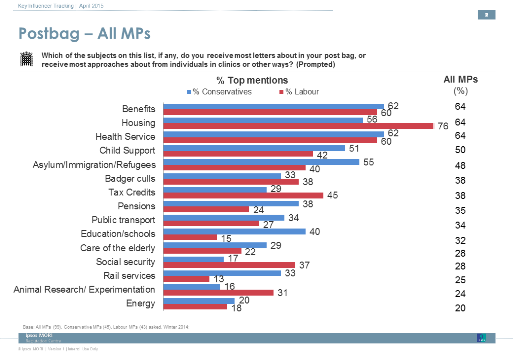To whom it may concern: The postbags of the next class of MPs

In just a few days, the corridors of Westminster will be graced by new faces. Prime Minister’s Question Time will hear from new voices. There will be new names representing well-established constituencies. How many new faces, voices and names there will be remains to be seen, but the time for change in the House of Commons is almost upon us. But do the prospective parliamentarians, the new blood in the heart of the British political system, know what lies in store for them should they be elected? Do they know what they can expect from their constituents, the very people they represent?
In our recent poll of prospective parliamentary candidates (PPCs), we asked PPCs what they expect to receive letters about if they become an MP. Housing is mentioned most frequently, by over a third (37%) of the PPCs surveyed, while a slightly smaller proportion (33%) say they expect to be contacted about the health service. In both cases, Labour candidates are more likely to think they will be approached about these issues than their Conservative counterparts. Amongst the Conservative PPCs surveyed, benefits (31%) are considered to be the most likely subject of future correspondence from constituents.

So, for those PPCs who are elected, will the contents of their postbags be as they expect? A good indication can be found in our most recent MPs’ survey, in which we asked those already serving which subjects they receive most letters about.
The same three issues – housing, the health service and benefits – receive the most mentions: almost two in three of the MPs surveyed say they receive correspondence on each of these subjects (64% mentions each). Yet, while the same top three receive the most mentions in the PPC survey, none of the subjects in question was mentioned by much more than a third of PPCs.

The difference in mentions between PPCs and MPs is most observable when the subject of asylum, immigration and refugees is considered. Fewer than one in ten (9%) PPCs interviewed think they will receive letters or approaches on this subject, yet almost half (48%) of MPs say that they do receive correspondence on such matters.
A gap is also evident across party lines. Only one in five (19%) Conservative PPCs think they will be contacted about immigration, even though a majority (55%) of current Tory MPs report receiving correspondence on this issue. For Labour, only a few (7%) PPCs mention immigration; a significantly smaller proportion than the two in five (40%) Labour MPs who mention receiving correspondence on it.
The low proportion of mentions amongst PPCs surveyed on the matter of immigration (at just 9%) could also suggest that parliamentary candidates are somewhat out of touch with the present concerns of the general public. In our most recent Issues Index almost half (45%) of those surveyed mentioned immigration/immigrants as an important issue facing Britain today. This correlates with the proportion of MPs (48%) receiving letters on such matters.

By contrast, housing is only mentioned by around one in seven (14%) of the general public as an important issue, but receives the most mentions from the PPCs surveyed (at 37%). Though this could be interpreted as another indicator of a disconnect between PPCs and the general public, historical data shows that housing has traditionally been much more of a MPs’ ‘postbag’ issue than is reflected in the Issues Index.

This continues to be the case today: almost two-thirds (64%) of the MPs surveyed say they have received correspondence on housing, despite its low (14%) proportion of mentions in the latest Issues Index. Thus, while housing issues affect only a minority of the general public, those who are affected seem more likely to write to their MPs.
Overall then, the PPCs surveyed appear to have a reasonably accurate sense of which subjects would be most likely to appear in their postbags if they are elected to sit in Parliament. They correctly identify that letters on benefits, housing and the health service would seem to await. However, across all subjects a smaller proportion of PPCs say that they would expect to receive communication from their constituents than is reported by MPs.
The comparatively low proportion of mentions among PPCs may suggest that they, perhaps understandably, lack certainty about what their postbags might contain should they be elected. Hopefully though, if the time comes, they will be well prepared for the task of responding to, and dealing with, all the concerns that their potential constituents might raise.
Ipsos’s Survey of MPs runs biannually in the summer and winter. We interview c.100 MPs face-to-face each wave. Results are weighted to be representative of the house in terms of party and ministerial status. Results in this article are from fieldwork conducted in November/December 2014.
Ipsos’s Survey of Prospective Parliamentary Candidates runs in the months before the general election. We interview c.100 candidates for election in marginal seats, defined as those needing less than a 15% swing to displace an incumbent. Interviews are carried out face-to-face. Results in this article are from fieldwork conducted in February/March 2015



